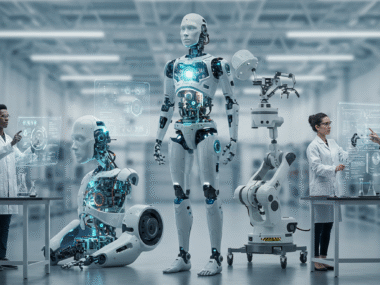Picture this: It’s 2025, and you’re sipping coffee while your AI assistant predicts your entire day before you even check your phone. That’s not sci-fi anymore—it’s the reality shaping the hottest job market on the planet. If you’ve ever dreamed of diving into a career where innovation meets big bucks, the AI engineer jobs in 2025 are calling your name. With companies like Google, Tesla, and startups pouring billions into artificial intelligence, these roles aren’t just jobs; they’re tickets to the future. In this guide, we’ll break down the top 10 AI engineer jobs you absolutely need to know about. We’ll chat about what each one entails, the skills that’ll make you stand out, salary ranges that could make your jaw drop, and tips to snag one. Whether you’re a fresh grad or switching gears mid-career, there’s something here for you. Let’s jump in and explore why 2025 is the year to level up your AI game.
Why AI Engineer Jobs Are Exploding in 2025
Before we get to the list, let’s set the scene. Artificial intelligence isn’t just a buzzword—it’s transforming everything from healthcare to entertainment. According to recent reports, the global AI market is projected to hit $500 billion by the end of this year, creating millions of opportunities. Demand for AI talent has skyrocketed by over 70% in the last couple of years, and it’s not slowing down. Why? Because businesses need pros who can build smart systems that learn, adapt, and solve real-world problems.
What makes these AI engineer jobs so appealing? For starters, the pay is insane—think six figures starting out, with bonuses that push totals into the seven-figure territory for seniors. Plus, the flexibility: remote work, global teams, and projects that feel more like missions from a blockbuster movie than desk drudgery. But it’s not all glamour; you’ll need a mix of tech savvy, creativity, and grit. If you’re passionate about coding, data, and making machines think like humans, you’re in the right place. Now, let’s dive into the top 10 roles that are dominating the AI careers landscape this year.
1. Machine Learning Engineer
Ever wondered who teaches computers to spot patterns in chaos? That’s the machine learning engineer, the wizard behind algorithms that power Netflix recommendations or fraud detection in your bank app. In 2025, this role is the crown jewel of AI engineer jobs, blending software engineering with data wizardry to create models that evolve on their own.
What Does a Machine Learning Engineer Do?
These folks design, build, and deploy machine learning models that help businesses make smarter decisions. One day, you might optimize a self-driving car’s navigation; the next, you’re tweaking a model to predict stock trends. It’s hands-on: collecting data, training models, testing for accuracy, and scaling them for production. With AI ethics under the microscope, you’ll also ensure your creations are fair and unbiased.
Key Skills You’ll Need
To thrive, brush up on Python or R for coding, libraries like TensorFlow and PyTorch for model building, and cloud platforms like AWS or Google Cloud for deployment. A solid grasp of statistics and linear algebra is non-negotiable—think calculus without the headaches. Soft skills? Problem-solving and communication, because you’ll explain complex models to non-tech execs.
Salary Expectations in 2025
Entry-level machine learning engineers are pulling in $120,000 to $150,000 annually, but with a few years under your belt, expect $180,000 to $250,000 base, plus stock options that can double that. In tech hubs like San Francisco or New York, totals often hit $400,000. It’s one of the highest paying AI jobs, no doubt.
Future Outlook
By 2030, the World Economic Forum predicts over 97 million new AI-related jobs, with machine learning at the forefront. Industries like finance and healthcare are begging for talent, so job security? Rock solid. If automation scares you, remember: these engineers are the ones building it, not getting replaced by it.
How to Land Your First Gig
Start with online courses on Coursera or edX—Google’s Machine Learning specialization is a gem. Build a portfolio on GitHub with real projects, like a sentiment analysis tool. Network on LinkedIn; attend AI meetups. Certifications from AWS or Microsoft can give you that edge. In six months, you could be interviewing at FAANG companies.
Machine learning engineering isn’t just a job; it’s a launchpad for innovation. If data excites you, this is your spot in the AI engineer jobs arena.
2. AI Engineer
Straight up, the AI engineer is the jack-of-all-trades in this field—the one who glues everything together. In 2025, as AI integrates into everyday apps, these pros are in hot demand, crafting systems from chatbots to predictive analytics tools.
What Does an AI Engineer Do?
Imagine architecting the brain of a virtual assistant or automating customer service with natural language processing. AI engineers handle the full lifecycle: from ideation and prototyping to integration and maintenance. They’re the bridge between raw data and actionable insights, often collaborating with data scientists and devs.
Key Skills You’ll Need
Proficiency in programming languages like Java, C++, or Python is key, alongside frameworks such as scikit-learn. Knowledge of neural networks and deep learning sets you apart. Don’t sleep on version control with Git or agile methodologies for team projects. Curiosity is your secret weapon—AI evolves fast, so lifelong learning is baked in.
Salary Expectations in 2025
Fresh out of school? You’re looking at $110,000 to $140,000. Mid-level roles climb to $160,000-$220,000, and seniors can command $300,000+ with perks. According to Glassdoor, total compensation in big tech often exceeds $450,000, making it a top contender among highest paying AI jobs.
Future Outlook
With AI adoption across sectors like retail and manufacturing, openings are up 40% year-over-year. The U.S. Bureau of Labor Statistics forecasts 23% growth through 2032—faster than most fields. It’s resilient too; as AI tools advance, engineers who can wield them will only get more valuable.
How to Land Your First Gig
Dive into bootcamps like Springboard’s AI program or free resources on Kaggle. Contribute to open-source AI repos to build cred. Tailor your resume with quantifiable wins, like “Developed an AI model reducing processing time by 30%.” Hit up job boards like Indeed for entry-level postings.
If you’re the type who loves seeing ideas come to life, AI engineering will feel like play, not work. It’s foundational for anyone eyeing AI careers in 2025.
3. Data Scientist
Data scientists are the storytellers of the AI world, turning mountains of numbers into narratives that drive business wins. In a data-drenched 2025, this role is essential for uncovering hidden gems in big data.
What Does a Data Scientist Do?
From analyzing customer behavior for e-commerce giants to forecasting disease outbreaks in health tech, data scientists clean data, run experiments, and visualize findings. They use statistical models to predict outcomes and recommend strategies, often feeding insights directly into AI systems.
Key Skills You’ll Need
SQL for querying databases, Python for analysis, and tools like Tableau for viz are must-haves. Dive deep into machine learning basics and A/B testing. Communication shines here—you’ll present findings to stakeholders who couldn’t code their way out of a paper bag.
Salary Expectations in 2025
Beginners earn $100,000-$130,000, but with experience, it’s $150,000-$200,000 base. Top earners in consulting firms hit $350,000 total comp. It’s consistently ranked among the best AI careers for work-life balance and pay.
Future Outlook
Demand is surging—LinkedIn reports data science as the fastest-growing job. With AI amplifying data’s power, roles will evolve but never fade. Sectors like energy and education are ramping up hires.
How to Land Your First Gig
Earn a master’s in data science or certifications from IBM. Practice on datasets from UCI Repository. Join communities like DataCamp forums. Apply to analyst roles as a stepping stone.
Data science isn’t about crunching numbers; it’s about unlocking truths. Perfect for analytical minds in the 2025 job hunt.
4. Computer Vision Engineer
Close your eyes and imagine computers “seeing” the world like we do—that’s computer vision engineering. In 2025, with AR/VR booming, these experts are building eyes for machines in everything from autonomous drones to medical imaging.
What Does a Computer Vision Engineer Do?
They develop algorithms that process images and videos: object detection for security cams, facial recognition for apps, or defect spotting in factories. It’s all about training models on visual data to enable real-time decisions.
Key Skills You’ll Need
OpenCV and CNNs are your bread and butter, plus Python and MATLAB. Understanding of image processing and transfer learning helps. Bonus: Experience with edge computing for on-device AI.
Salary Expectations in 2025
Entry pay: $115,000-$145,000. Mid-career: $170,000-$240,000. At places like NVIDIA, totals reach $400,000+. High CPC keywords like “computer vision engineer salary” reflect the premium pay.
Future Outlook
Growth is explosive—think 30% annually, driven by self-driving cars and smart cities. It’s a niche but future-proof slice of AI engineer jobs.
How to Land Your First Gig
Courses on Udacity’s Computer Vision nanodegree. Projects like building a face detector app. Network at CVPR conferences.
This role turns pixels into possibilities. If visuals fire you up, it’s your 2025 calling.
5. Natural Language Processing Engineer
Words are the new code, and NLP engineers are the linguists making machines converse like pros. From voice assistants to translation tools, 2025 sees NLP powering global communication.
What Does a Natural Language Processing Engineer Do?
They craft systems that understand, generate, and translate human language: sentiment analysis for social media, chatbots for support, or summarizers for news. It’s tackling ambiguities like sarcasm or dialects.
Key Skills You’ll Need
NLTK, spaCy, and transformers like BERT. Linguistics basics plus deep learning. Ethical handling of biased language data.
Salary Expectations in 2025
Starters: $120,000-$150,000. Experts: $180,000-$260,000, up to $380,000 total. A staple in highest paying AI jobs lists.
Future Outlook
With multilingual AI on the rise, jobs grow 25%. E-commerce and legal tech lead the charge.
How to Land Your First Gig
fast.ai NLP course. Build a translation bot. Target roles at Meta or OpenAI.
NLP bridges humans and machines—ideal for word lovers in AI careers.
6. Robotics Engineer (AI Focus)
Robots aren’t just in movies anymore; they’re assembling cars and exploring Mars. AI-focused robotics engineers in 2025 are the puppeteers making bots smarter and safer.
What Does a Robotics Engineer Do?
Integrate AI into hardware: path planning for warehouse bots, gesture recognition for humanoids. Test in sims before real-world deployment.
Key Skills You’ll Need
ROS framework, control systems, reinforcement learning. Hardware like sensors and actuators.
Salary Expectations in 2025
$110,000-$140,000 entry; $160,000-$220,000 mid. Boston Dynamics pays top dollar, $350,000+.
Future Outlook
35% growth with automation waves. Manufacturing and eldercare boom.
How to Land Your First Gig
MIT’s robotics online class. Arduino projects. Intern at iRobot.
Hands-on heaven for tinkerers eyeing AI engineer jobs.
7. AI Research Scientist
The mad scientists of AI, pushing boundaries with groundbreaking papers and prototypes. In 2025, they’re inventing tomorrow’s tech today.
What Does an AI Research Scientist Do?
Experiment with novel algorithms, publish findings, collaborate on moonshot projects like AGI.
Key Skills You’ll Need
PhD-level math, PyTorch mastery, grant writing.
Salary Expectations in 2025
$130,000-$160,000 start; $200,000-$300,000 senior. Labs offer $500,000+ packages.
Future Outlook
Steady 20% rise, fueled by R&D investments.
How to Land Your First Gig
Publish on arXiv. Apply to DeepMind residencies.
For the curious at heart, pure innovation awaits.
8. AI Product Manager
Not all AI heroes code—product managers shape how AI delights users, balancing tech with market needs in 2025’s competitive scene.
What Does an AI Product Manager Do?
Define roadmaps, prioritize features, A/B test AI products like recommendation engines.
Key Skills You’ll Need
Agile, user research, basic ML knowledge. Business acumen.
Salary Expectations in 2025
$140,000-$170,000 base; $250,000+ total.
Future Outlook
30% growth as AI products proliferate.
How to Land Your First Gig
Product School certs. Shadow at startups.
Blend of strategy and tech—perfect hybrid role.
9. Chief AI Officer
The C-suite visionary steering companies through AI transformation. In 2025, every boardroom needs one.
What Does a Chief AI Officer Do?
Strategize AI adoption, mitigate risks, align with goals.
Key Skills You’ll Need
Leadership, ethics, industry foresight.
Salary Expectations in 2025
$250,000-$400,000 base; millions in equity.
Future Outlook
Exploding demand in enterprises.
How to Land Your First Gig
Climb from engineer roles. MBA helps.
Executive path for ambitious leaders.
10. AI Ethics Specialist
As AI grows, so do concerns—ethics specialists ensure fairness, privacy, and transparency in deployments.
What Does an AI Ethics Specialist Do?
Audit algorithms, develop guidelines, advise on regulations.
Key Skills You’ll Need
Philosophy, policy, bias detection tools.
Salary Expectations in 2025
$120,000-$150,000 entry; $180,000-$250,000 senior.
Future Outlook
Critical 40% surge with new laws.
How to Land Your First Gig
Ethics courses on edX. Join AI fairness groups.
Moral compass meets tech—vital for responsible AI careers.
Conclusion
There you have it—the top 10 AI engineer jobs lighting up 2025. From coding marvels to strategic minds, each offers a unique path to impact and reward. The common thread? Passion for progress and a willingness to learn. Whether you’re eyeing machine learning engineer salaries or dreaming of robotics breakthroughs, start small: upskill, build, connect. The AI revolution isn’t waiting—jump in now.
Ready to take the plunge? Check out these resources to kickstart your journey:
- Explore AI courses on Coursera for hands-on learning.
- Browse openings on LinkedIn Jobs tailored to your skills.











